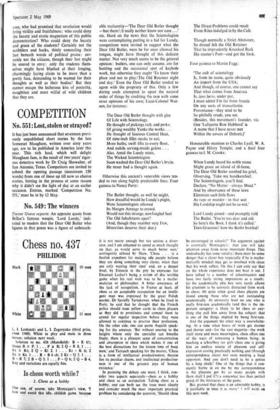Chess no. 437
PHILIDOR
Black 10 men 11 men
L. I. Loshinski and L. 1. Zagoryuko (third prize, USSR 1968). White to play and mate in three moves; solution next week.
Solution to no. 436 (Mansfield): B - R 6!; threat B X P. 1 . . . P X B; 2 Q- R 8. 1 . . . Kt x Kt; 2 Q - Kt 2. 1 . . . Kt - K 6; 2
Kt x Kt. 1 . R - B 6 ch; 2 Kt - Q 3. I . . B - R 7; 2 B - Q 3. 1 . . . P - Q 6; 2 Q B 4. Key and variations are equally fine.
Is chess worth while?
I. Chess as a hobby One can, of course, take Montaigne's view, 'I hate and avoid this idle, childish game. because it is not merry enough but too serious a diver- sion, and I am ashamed to spend as much thought on that, as would serve to much better uses,' astringently echoed by Shaw, 'Chess . . . is a foolish expedient for making idle people believe they are doing something very clever, when they are only wasting their time' and, on a deeper level, by Einstein in the pity he expresses for Emanuel Lasker's being a victim of this terrible game when his real wish was to be a mathe- matician or philosopher. A bitter awareness of the lack of recognition, in France at least, of chess as an acceptable occupation for an intelli- gent man was expressed by the great Polish master, Dr Savielly Tartakower. when he lived in Paris; he said that he thought that the French police should issue yellow cards to chess players as they did to prostitutes and compel them to attend for regular inspection before they were allowed to continue to practise their profession. On the other side, one can quote Asquith speak- ing for the amateur, 'But without soaring to the heights where only the specialist can breathe freely, there is a pleasant sense of concentration and absorption in chess which makes it one of the best distractions for the leisure time of busy men,' and Tarrasch speaking for the master, 'Chess is a form of intellectual productiveness; therein lies its peculiar charm, and intellectual productive- ness is one of the greatest joys of human existence.'
In pursuing the debate one must, I think, con- sider two aspects separately—chess as a hobby and chess as an occupation. Taking chess as a hobby, one can both see the issue most clearly and consider much the most important practical problem by considering the question, 'Should chess
be encouraged in schools?' The argument against is essentially Montaigne's: that you will take attention away from more important things. This undoubtedly has some validity; there must be some danger that a clever boy (especially if he is mathe- matically minded) may get so involved with chess that his work suffers. On this I can only say that on the whole experience does not bear it out. I have talked to a number of schoolmasters and have two fairly strong impressions as, a result: (a) the academically able boy very rarely allows his attention to be seriously distracted from work to chess; (b) quite often good chess players are found among those who are not outstanding academically. At university level no one who is really first-rate academically (and this is the im- portant category) is likely to let chess or any- thing else pull him away from his subject; that is one of the things implied by being first-rate.
And the argument the other way is overwhelm- ing. At a time when hours of work get shorter and shorter and—for the vast majority—the work itself more and more meaningless, chess offers one of the ways of remaining a human being; in teaching a schoolboy (or girl) chess one is giving him an endless source of pleasure and self- expression costing practically nothing and (through correspondence chess) not even needing a local opponent. And you don't need to be a genius by a long chalk! One of the things that is con- stantly borne in on me by my correspondence is the pleasure got by so many people with (how shall I put, it?) a somewhat less than perfect grasp of the intricacies of the game.
But_ granted that chess is an admirable hobby, is it justifiable to treat it as more? t will write on this next week.


































 Previous page
Previous page